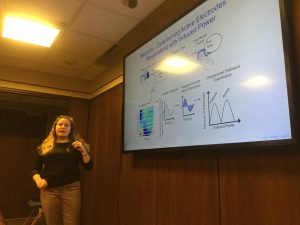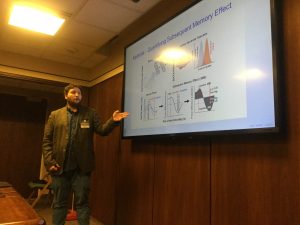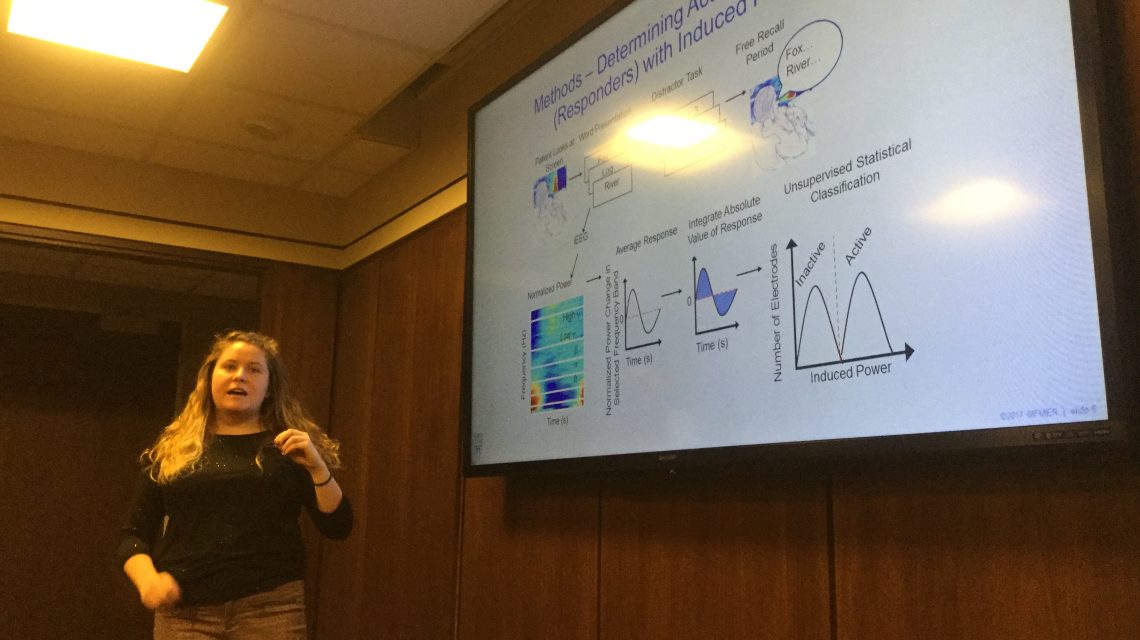Our international BME lab team is growing… 26 listopada 2019 – Posted in: Uncategorized


We are currently completing our one year research placement in the Mayo Systems Electrophysiology Laboratory (MSEL) at Mayo Clinic – our strategic US research partner in the First Team grant. During this placement we have grown a team of senior researchers, students, and research assistants all engaged in our project to map and enhance human memory. All of our most recent results and ideas have been discussed among the team members weekly on our ‚Memory and Cognition’ and MSEL lab meetings, where we recently presented the latest results (see photo attached). This news is to acknowledge individual members of this international team contributing their talents to the BME lab mission from across the globe!
Vaclav Kremen (Czech Republic) – senior engineer in MSEL and one of the lead researchers in MSEL’s largest project of the BRAIN initiative to treat epilepsy with intelligent technology for closed-loop recording and stimulation in the brain via cloud computing and wireless mobile interface for patients. Vaclav contributes his expertise in artificial intelligence, machine learning and signal processing to our efforts aimed at deciphering human memory.
Petr Nejedly & Vladimir Sladky (Czech Republic) – early stage researchers in MSEL, working primarily in Vaclav’s project. Both are experts in machine learning applications for processing brain signals, including their pioneering efforts in deep-learning to detect and predict seizures. They invaluable skills and computing resources have accelerated our latest discoveries.
Saboo Krishnakant (India) – PhD student of biomedical engineering at University of Illinois Urbana-Champaign, who has collaborated with MSEL and BME since the beginning of his doctorate. Saboo is the lead author of a fully automated machine learning method and novel measures used to select signals recorded from brain regions involved in encoding information into memory. His results opened the door for mapping and finding targets for brain stimulation to enhance memory.
Tory Marks (USA) – PhD student of biomedical engineering at the Mayo Graduate School, whose project is focused on the brain recording and stimulation technologies for treating cognitive deficits in epilepsy and other neurodegenerative disorders. Tory’s first results from a short rotation that she did at MSEL supervised by Dr. Kucewicz have started a whole line of research into the slow brain waves and their role in remembering words. Together with Cagdas they are now mapping slow brain oscillations in the frontal lobes found to be critical for encoding new memory traces.
Theodore Thayib (Indonesia) – BA student of computer sciences at the Iowa State University interested in using his programming skills to help our clinical research in solving problems related to memory and the human mind. Theo completed a short Winter placement and a 3-month Summer internship with our BME lab team, during which he contributed codes to process new datasets from Mayo Clinic patients and created a state-of-the-art video of the human brain wave activity underlying formation of new memories for words. This video continues to inspire ideas about how our brain works and can be treated to restore its mental functions.
As a result of this team effort, we now see the first fruits coming… Saboo’s manuscript about machine learning methods for automatic identification of brain regions activated in memory tasks has recently been accepted for publication in Nature Scientific Reports (stay tuned to hear more…). Tory presented her final results about slow and fast brain waves supporting memory together with Cagdas on the last annual meeting of the Society for Neuroscience (see October news), which will soon be submitted for journal publication. Theo contributed a state-of-the-art video showing these brain waves across time and several frequency dimensions (see our last July news release). Vaclav and Petr have played instrumental roles in the signal processing, computing power, and machine learning aspects of all of these projects. Without the help of all the scientists working together with our BME lab, all these recent discoveries would not be possible.
Our placement at MSEL will be completed this month. We return to Gdansk not only with a unique dataset of invasive recordings from 15 epilepsy patients during memory tasks with eye-tracking but, more importantly, we established a superb team of international scientists dedicated to work with us on solving the mysteries of the human mind.

